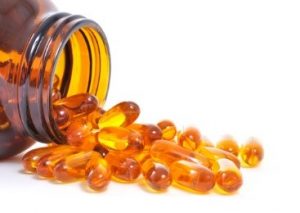Can Omega-3s Protect Your Brain?
Author: Dr. Stephen Chaney
 Contact sports like football and soccer can be an athlete’s ticket to fame and fortune. That is a powerful motivator. But many elite athletes in contact sports pay a terrible price after their playing days are over.
Contact sports like football and soccer can be an athlete’s ticket to fame and fortune. That is a powerful motivator. But many elite athletes in contact sports pay a terrible price after their playing days are over.
Repeated head trauma can lead to a condition called Chronic Trauma Encephalopathy or CTE. In CTE, a protein called Tau forms clumps that spread through the brain, killing brain cells. Eventually, this can lead to irrational behavior and/or early-onset Alzheimer’s, which is, indeed, a terrible price to pay for their brief moment in the spotlight.
The NCAA is aware of the damaging effects of repeated head trauma and are experimenting with rule changes and improvements to protective head gear to reduce it. But, given the pressures of college teams to win at all costs, it will be impossible to completely eliminate head trauma from contact sports.
So, it is important to ask, “What else we can do?” Several studies have suggested that omega-3s may mitigate the damaging effect of repeated head trauma. For example:
- The omega-3s DHA and EPA are metabolized to molecules called resolvins and protectins, which protect brain tissue from oxidative stress and help restore damaged brain tissue.
- DHA and EPA also reduce the inflammation associated with brain injury, so the brain can heal faster.
- DHA and EPA boost the level of a protein called BDNF in the brain. It helps trigger the production of new brain cells, which also aids in the recovery from brain injury.
- Finally, some medical clinics have reported that high dose omega-3s help speed the recovery from severe head trauma.
- This is concerning because omega-3s are largely missing from the diet of college athletes.
This raises the question, “Should athletes be taking omega-3s?”
The kinds of studies mentioned above suggest that DHA and EPA might help protect athletes from the damaging effects of repeated head trauma, but it is difficult to prove:
- If a patient comes into a clinic with severe brain trauma, the symptoms are obvious. And if omega-3s speed recovery it will become apparent in weeks or months. This effect is easy to measure.
- On the other hand, the effects of repeated, minor head trauma on a highly trained athlete are often not apparent until decades later. Therefore, any protective effects of omega-3s would also not become apparent for decades. Clinical studies don’t last that long.
Because of this, current research focuses on markers of brain damage such as neurofilament light chain or Nf-L. Nf-L is a neuronal protein that is released into the bloodstream by dying neurons. It is widely considered to be an early marker for neurodegenerative diseases such as those seen in former college football players. Previous studies have shown:
- Nf-L blood levels increase during the season for NCAA-level college football players.
- College football players have a very low omega-3 index, a measure of omega-3 status.
- DHA supplementation reduces Nf-L levels in college football players.
With this in mind, the authors of this study (JL Heileson et al, Journal of the International Society of Sports Nutrition 18:65, 2021) looked at the effect of a high-dose, comprehensive omega-3 supplement on Nf-L levels in the blood of NCAA football players during the playing season.
How Was This Study Done?
 Volunteers from two geographically distinct NCAA football teams were recruited for this study. One team (n=31) was given a daily high-dose omega-3 supplement providing 2,000 mg of DHA, 560 mg of EPA, and 320 mg of DPA starting during pre-season (fall) practices and continuing through the entire season. Compliance with the supplement regimen was 93%.
Volunteers from two geographically distinct NCAA football teams were recruited for this study. One team (n=31) was given a daily high-dose omega-3 supplement providing 2,000 mg of DHA, 560 mg of EPA, and 320 mg of DPA starting during pre-season (fall) practices and continuing through the entire season. Compliance with the supplement regimen was 93%.
Volunteers from the other team (n=35) received no supplements and served as a control.
Participants from both teams were advised which foods were high in omega-3s and were asked to limit servings to no more than 2 per week for the duration of the study.
Players were excluded from the study if they:
- Were on long-term (>20 days) anti-inflammatory therapy.
- Were using fish oil supplements.
- Ate more than two servings of fish per week.
- Were on medications to control blood pressure or blood lipid levels.
Blood samples were drawn 7 days before pre-season practice, at the end of pre-season practice, 3 times during the season, and at the end of the season (a total of 6 blood draws).
The blood samples were analyzed for Nf-L, a marker of brain injury, and Omega-3 Index, a measure of omega-3 status.
Should Athletes Be Taking Omega-3s?
 As I stated above, compliance with the supplementation regimen was excellent (93%) and this was reflected in the blood levels of long-chain omega-3s. Between the first and last blood sample drawn:
As I stated above, compliance with the supplementation regimen was excellent (93%) and this was reflected in the blood levels of long-chain omega-3s. Between the first and last blood sample drawn:
- DHA and EPA levels increased 2-fold.
- DPA levels, on the other hand, decreased slightly.
-
- This suggests that the beneficial effects of omega-3 supplementation were primarily due to DHA and EPA. I will discuss the implications of this below.
- The omega-3 index increased from 4.3%, which is considered poor, to 7.4%, which is considered near optimal.
The effect of omega-3 supplementation on Nf-L levels was striking:
- In the control team (no supplementation) Nf-L levels increased 1.5-fold during the pre-season practices and remained elevated throughout the regular season.
- In the team receiving omega-3 supplementation there was no significant increase in Nf-L levels.
The authors of the study concluded, “These findings suggest a…neuroprotective effect of combined EPA+DPA+DHA omega-3 fatty acid supplementation in American-style football athletes.”
The authors went on to say, “Similar elevations of Nf-L have been reported with RHI [repeated head injuries] in other contact sport athletes. These data suggest that those other contact sports athletes may also benefit from omega-3 supplementation…”
So, let’s return to the original question, “Should athletes be taking omega-3s?” Here is my take on the study:
- The conclusions of the authors are appropriately cautious. This study shows that omega-3 supplementation reduces an indicator of possible brain damage (Nf-L), but the actual symptoms of brain damage don’t appear for decades.
-
- Therefore, this study suggests, but doesn’t prove, that omega-3 supplementation may reduce Chronic Trauma Encephalopathy (CTE) for athletes who competed in contact sports during their college years.
- This study used an omega-3 supplement containing EPA, DHA, and DPA. It resulted in an increase in EPA and DHA levels, but not DPA levels. Thus, there is no evidence that the DPA portion of the supplement was needed. I recommend a supplement with a 4:1 ratio of DHA to EPA for brain health.
- This study did not establish an optimal dose of omega-3s. Until more information is available, I would recommend around 2,000 mg of DHA and 500 mg of EPA for athletes in contact sports, but the optimal dose may be lower or higher.
Can Omega-3s Protect Your Brain?
 If you are not a college athlete competing in contact sports (which would include most of us), you are probably wondering what this means for you. Here are my thoughts.
If you are not a college athlete competing in contact sports (which would include most of us), you are probably wondering what this means for you. Here are my thoughts.
As Benjamin Franklin said, “An ounce of prevention is worth a pound of cure.”
- You never know when you may suffer unexpected head trauma. It could be a car accident. It could be a fall. You might be playing a friendly game of softball and get hit in the head by a foul ball. You get the point.
- And the best time to make sure you have enough omega-3s (specifically DHA + EPA) in your brain is before the trauma occurs.
But how much DHA + EPA is enough? This is where it gets confusing.
- Recommendations range from 500 mg/day to 3,000 mg/day depending on whether the goal is to reduce death from heart disease, lower blood pressure, or lower triglycerides.
- This study used 2,500 mg/day to reduce a marker of brain damage in college athletes, but we don’t know whether that is optimal.
- Finally, these numbers are averages, and none of us are average. We all utilize omega-3s from supplements with different efficiencies.

My recommendation is to use the Omega-3 Index as a gauge. It tells us how much DHA + EPA we have actually accumulated in our tissues.
- An Omega-3 Index of 8% is considered optimal for heart health, and this study suggests it might be optimal for brain health as well.
- So, my recommendation is to get your Omega-3 Index measured at 6-month intervals until you have determined the amount of supplemental DHA + EPA you need to attain and maintain an 8% Omega-3 Index.
- Based on this study, I would recommend a high-purity supplement with an ~4:1 ratio of DHA to EPA if your primary goal is brain health. But other studies suggest that an EPA to DHA ratio of 3:2 may be optimal for heart health.
In short:
- While the evidence is not definitive, this study suggests that it might be prudent to have accumulated enough DHA and EPA in your neural tissue to help reduce the complications of unexpected brain trauma.
- This study also suggests that you may wish to aim for an Omega-3 Index of 8%.
-
- An Omega-3 Index of 8% likely has side benefits. There is also evidence that it may reduce the rate of cognitive decline as you age, help protect your heart, and reduce inflammation.
- The ratio of DHA to EPA in the supplement you choose may be different for brain health and heart health. If you are equally interested in brain and heart health, just be sure your supplement provides both DHA and EPA.
The Bottom Line
Repeated head injuries are a major concern for NCAA football players and college athletes in other contact sports. That’s because repeated head injuries during their playing years are associated with a degenerative brain condition called Chronic Trauma Encephalopathy or CTE, which can lead to irrational behavior and/or early-onset Alzheimer’s.
A recent study looked at the effect of a high-dose, comprehensive omega-3 supplement on Nf-L, a marker of brain injury, in NCAA football players during the playing season. Two teams were selected.
- In the team receiving no omega-3s, Nf-L increased 1.5-fold during preseason practice and remained elevated throughout the playing season.
- In the team receiving omega-3 supplementation there was no significant increase in Nf-L levels.
The authors of the study concluded, “These findings suggest a…neuroprotective effect of… omega-3 fatty acid supplementation in American-style football athletes.”
The authors went on to say, “Similar elevations of Nf-L have been reported with RHI [repeated head injuries] in other contact sport athletes. These data suggest that those other contact sports athletes may also benefit from omega-3 supplementation…”
For more information on this study and what it means for all of us who are not college athletes, read the article above.
These statements have not been evaluated by the Food and Drug Administration. This information is not intended to diagnose, treat, cure, or prevent any disease.
____________________________________________________________________________
My posts and “Health Tips From the Professor” articles carefully avoid claims about any brand of supplement or manufacturer of supplements. However, I am often asked by representatives of supplement companies if they can share them with their customers.
My answer is, “Yes, as long as you share only the article without any additions or alterations. In particular, you should avoid adding any mention of your company or your company’s products. If you were to do that, you could be making what the FTC and FDA consider a “misleading health claim” that could result in legal action against you and the company you represent.
For more detail about FTC regulations for health claims, see this link.
https://www.ftc.gov/business-guidance/resources/health-products-compliance-guidance
